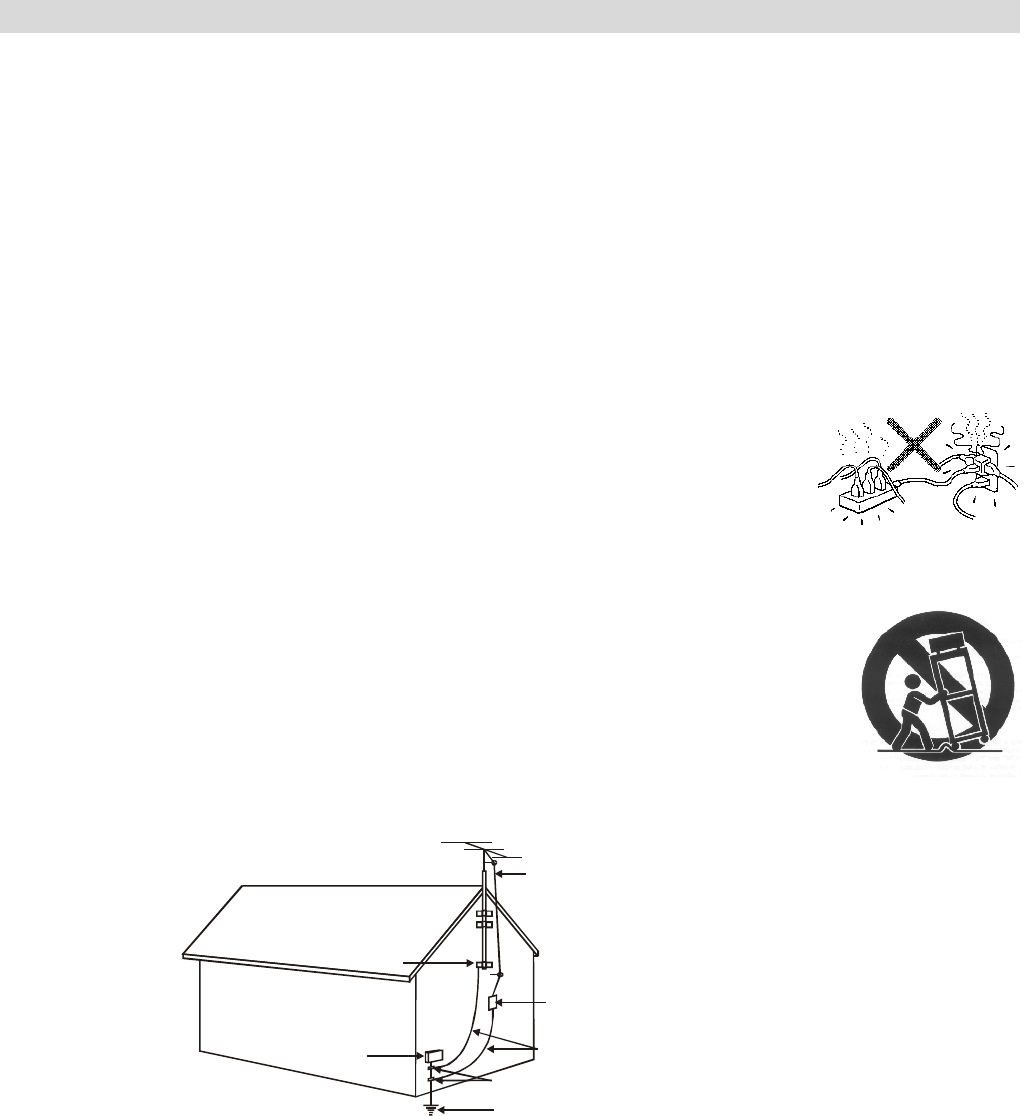
2
IMPORTANT SAFETY INSTRUCTIONS
Caution: Read This Before Operating Your Unit.
1. READ AND FOLLOW INSTRUCTIONS: All the safety and operation instructions should be read before the product is
operated. Follow all operation instructions within this manual.
2. RETAIN INSTRUCTIONS: The safety and operation instructions should be retained for future reference.
3. HEED WARNINGS: Comply with all warnings on the product and in the operation instructions.
4. CLEANING: Unplug this product from the wall outlet before cleaning. Do not use liquid cleaners or aerosol cleaners. Use a
damp cloth for cleaning.
5. GROUNDING or POLARIZATION: This product may be equipped with a polarized alternating current line plug (a plug
having one blade wider than the other). This plug will fit into the power outlet only one way. This is a safety feature. If you are
unable to insert the plug fully into the outlet, try reversing the plug. If the plug should still fail to fit, contact your electrician
since it is likely you have an out of sate wall socket. Never force the plug into the socket.
6. OVERLOADING: Do not overload wall outlets or extension cords as this can result in the risk of
fire or electric shock. Overloaded AC outlets, extension cords, frayed power cables, damaged
or cracked wire insulation, and broken plugs are dangerous. They may result in electric shock
or fire hazard. Periodically examine the power cable - if its appearance indicates damage or
deteriorated receptacles have it replaced by your service technician.
7. POWER SOURCES: This product should be operated only from the type of power source indicated on the rear panel label. If
you are not sure of the type of power supply to your home, consult your product dealer or local power company. For products
intend to be operated from battery power, or other sources, refer to the operation instructions.
8. ACCESSORIES: Do not place this product on an unstable surface or support. The product may fall,
causing serious injury to a child or adult as well as serious damage to the product. Any mounting of
the product should follow the manufacture’s instructions and use a mounting accessory
recommended by the manufacturer. A product and cart combination should be moved with care.
Quick stops, excessive force, and uneven surfaces may cause the product and cart combination to
overturn.
9. OUTDOOR ANTENNA GROUNDING: If an outside antenna or cable system is connected to the
product, be sure the antenna or cable system is grounded so as to provide some protection against voltage surges and
built-up static charges. The example below is for reference only. Correct grounding should always be installed by an
electrician.
ANTENNA
LEAD IN
WIRE
ANTENNA
DISCHARGE UNIT
(NEC SECTION 810-21)
GROUNDING CONDUCTORS
(NEC SECTION 810-21)
GROUND CLAMPS
POWER SERVICE GROUNDING
ELECTRODE SYSTEM
(NEC ART 250.PART H)
ELECTRIC
SERVICE
EQUIPMENT
GROUND
CLAMP
10. POWER-CORD PROTECTION: The power supply cables should be routed so that they are not likely to be walked on or
pinched by items placed upon or against them, paying particular attention to cables at plugs and the point where they exit
from the product.
11. ATTACHMENTS: Do not use unauthorized attachments as they may cause faults with the unit.
12. CONDITIONS REQUIREING SERVICE: Unplug this product from the wall outlet and refer servicing to qualified service
personnel under the following conditions:
a) If the unit exhibits sudden unusual operation or unusual display characteristics.
b) If the unit exhibits sudden unusual operation or unusual display characteristics.
c) b. If liquid has been spilled, or objects have fallen into the product.
d) If the product has been exposed to rain or water.
e) If the product does not operate normally by following the operation instructions, adjusting only those controls that are
covered by the operation instructions. (NOTE: improper adjustment of other controls may result in damage and will
often require extensive work by a qualified technician to restore the product to its normal operation).
f) If the product has been dropped or damaged in any way.
g) If the product exhibits a distinct change in performance.


















